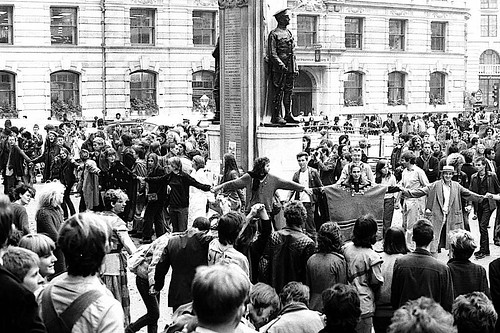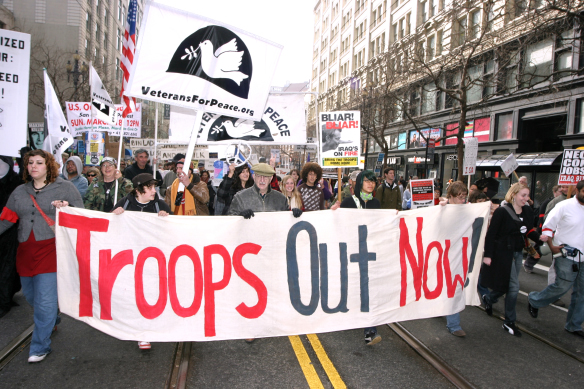 Students, pensioners and working people are marching in London to the Bank of England today to make it clear to the government and the bankers that we will not pay for their crisis. Assemble outside the Bank of England at 4pm today.
Students, pensioners and working people are marching in London to the Bank of England today to make it clear to the government and the bankers that we will not pay for their crisis. Assemble outside the Bank of England at 4pm today.Within a day of confirming £50bn to part-nationalise Britain's biggest banks, this figure was turned into £500bn. There was talk of another £50bn available to the eight largest banks and building societies, another £200bn for short-term borrowing to provide liquidity and a special company to provide up to £250bn in loan guarantees. Did the taxpayer ever get a chance to agree to this change? Or indeed the whole idea of bailing out the banks and the bankers? The short answer is no.
But part of the problem is, so far, "recapitalisation" of the banking industry has done nothing to regain confidence in the markets, let alone being a "bold and far-reaching solution" to the crisis, as Gordon Brown would have us believe. This is because nobody knows the extent of "toxic assets" or where they are located, least of all the government. The FTSE index has lost nearly 19 percent so far this week, just short of the losses during the crash of 1987.
So where does HM Treasury get all this money? Government borrowing means that the taxpayer pays for this crisis. In time this means there will be less money for schools, less money for hospitals and less money for the things that the majority need; that is, unless the government chooses to spend public money on these things. Or, unless the public makes the government spend money on these things.
Even if city bonuses are reduced from their staggering levels, the Centre for Economics and Business Research reports that the forecast for bonuses to be paid out this year is £3.5bn. Billions in company profits among energy companies such as British Gas and supermarkets such as Tesco, combined with rising fuel and food prices by these same companies, is only feeding anger among working people.
Pensioners are also being hit badly by the crisis, with no benefit from the bailout. According to analysts, in the last month alone, retirement savings have lost more than 10% of their value as investors sell their shares to avoid the worst effects of the credit crunch. Ros Altmann, an independent pensions analyst said, "the government's response to the credit crunch is dreadful for pensions. This knee-jerk panic reaction shows no sign of understanding how we got into the mess, nor how to get out of it."
This is why students, pensioners and working people are marching to the Bank of England today to make it clear that we will not pay for their crisis. When it comes to bailing out the banks and the bankers the government can find hundreds of billions of pounds, but when it comes to pensioners freezing in their homes, student poverty, or money for the NHS, the message from the government is that we need to tighten our belts. This is our chance to say no.















3 comments:
And what about the poor the pensioners who have to have bank accounts or have small amounts of saving we lose this to make you lot happy
Robert,
Are you serious? At a time when many of us face losing our jobs and our homes, Brown’s plan is aimed at rescuing the banks so that they can go back to doing what got them into trouble in the first place – speculating with our pension funds and making profits out of our debt.
As John McDonnell MP put it recently:
"Taxpayers will want to know what they have got for their money. Under public pressure, the government has been forced into placing some limited and temporary constraints on executive pay and bonuses and may appoint some non-executive directors. Not a lot for £500bn of public money. The government has drifted into majority or sizeable ownership of individual banks without any coherent strategy about how to use its shareholding.
Let us be clear, the banks which the government has taken into part-nationalisation would have collapsed entirely where it not for government intervention. The billions invested today surpass even the most generous estimates of the banks' worth."
Billions of pounds of our public money has been poured into this "bail out" yet the Banks have not been fully nationalised or placed under any proper democratic control & there is no bail out for ordinary people. It was the same with Northern Rock - they nationalised the liability, and left the profits in private hands - this was the bank that was infamous for house repossessions. No bail out for working class people once again!
Meanwhile Tories and Labour want try to make ordinary working people like you and I bear the cost of the bailout. We will be told we must pay, through massive cuts to our public services, and through job cuts and repossessions when the recession hits.
Yet vast amounts of wealth remain untouched – sloshing around the City, the hedge funds and countless offshore tax havens.
We should demand that the government takes over that wealth and uses it to guarantee our homes, jobs and pensions.
If the government can find money for bankers in a matter of days, there is no reason why it cannot immediately raise the state pension, provide every child in Britain with free school meals, or pay public sector workers a decent wage.
Our main slogan is that "we won't pay for their crisis".
This is essentially what is happening, the government want ordinary people to pay for a credit crunch caused by the rich and powerful's greed and mismanagement of the economy.
They believe in nationalisation to bail out the rich, we believe in nationalisation to raise the living standards of working people.
We aim to expose how Brown and other leaders main concern has been bailing out the rich, and little concern for the 25,000 pensioners that Help the Aged say might die this winter due to fuel poverty.
The government refused to introduce a modest windfall tax on the profits of energy companies that could have save lives. The gas companies are making increasing gas bills at a time of hardship for most people when they are making record profits.
What about local councils which have to provide services who have lost money in icelandic banks? The amount of money that Welsh councils need is less than bankers will be taking home in bonuses at Xmas. Yet there is no bail out for bodies on the frontline of providing local services.
And at a time when 2 million are forecast to be unemployed by Christmas, with unemployment maybe reaching Thatcher levels by this time next year, the government is introducing the most draconian welfare regime ever seen in Britain, US style "Workfare" where longterm unemployed will be forced to do community service like criminals and government ministers talking about people being kicked out of council houses if it is deemed that they are not looking for work.
It shows how wicked Brown is, when we are in a situation where the Tories can pose to the left of Gordon Brown by calling for an end to binge bonuses in the banks that the taxpayers are propping up. But Brown is so in hoc to the rich that he will defend them tooth-and-nail.
We aim to build a new campaign that will also be linked in with growing trade union militancy. As you may be aware, the government is currently trying to force a wage freeze across the public sector, as the first step towards driving down wages across the board, hence the recent wave of strikes among postal workers, teachers, lecturers, civil servants, council workers etc.
What they do is very reasonable. They cant digest to see all these 'drops' happening with their hard earned funds which they expect it to secure their future.
RetireDebtFreeHappy - retirement plans, retirement planning calculator, retirement planning, early retirement planning, retirement savings, retirement investments, financial planning for retirement, saving for retirement, retirement income, retirement funds
Post a Comment